Has your law firm website been penalized?
Everyone knows about the major algorithm changes Google recently that have left many aggressive internet marketers in Googles peanut gallery. The two main updates were Panda and Penguin and for the purposes of this post we will be focusing ONLY on the Penguin update which occurred on April 24, 2012.
For the sake of time I will not dive too deep into actually explaining the Penguin update. Here is all you really need to know:
The penguin update was implemented by Google to combat web spam. Most notably link spam.
So in essence they wanted to render unnatural linking strategies ineffective and punish anyone who was building inorganic links to their website.
Basically, this means that if you or your SEO agency participated in any questionable linking tactics (Including, but not limited to, building links from article directories, blog networks, forum profiles, forum posts, and blog comments.) you are in danger of potentially being penalized by Google.
I know the Legal Marketing industry pretty well and I also know that these unnatural linking strategies have run rampant in years past in our industry. I am not going to lie I practiced these strategies myself and had tremendous success in doing so. For a long time building these types of “spam” links was the norm and almost everyone in a competitive area, such as DUI Law or Personal Injury Law, had to do it. If your firm wasn’t building these kinds of links then most likely you couldn’t be found on the first page of Google for your money keywords.
With that being I said, I know there are a lot of law firms out there that have been penalized and have seen a tremendous drop in their search ranking or search traffic. I personally know a number of lawyers who have experienced and are still experiencing problems with penalties. The good news is that I am here to help. I have had the pleasure (sarcasm ensues) of recovering many law firm websites from Penguin Bites (penalties).
The first thing you must do is determine what type of penalty, if any, you have been given. There are 3 options here:
- Manual Penalty
- Algorithmic Penalty
- No Penalty
The Manual Penalty
If you have been issued a manual penalty from Google you will most likely receive a notification in your Google Webmaster Tools account. It will look a little something like this:
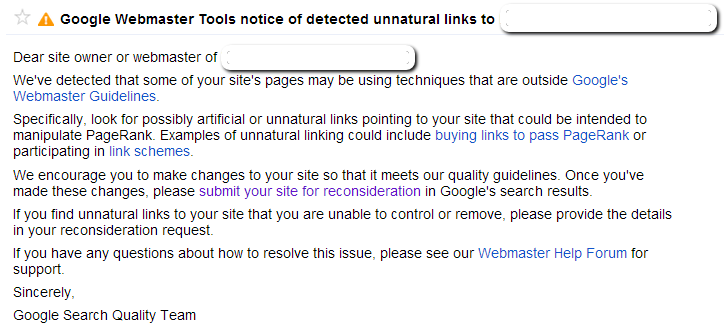
In most cases this notification will be accompanied by sharp decrease in rankings and referral traffic from Google.
If you noticed above I said “you will most likely receive a notification” for a manual penalty, however, there are instances in which Google does NOT send out a notification of a manual action. I do not know why and can’t find much information on these instances. I only know this from actual experience. Luckily this is pretty easy to test for. The process for testing for an un-notified manual penalty goes hand in hand with testing for an algorithmic penalty.
The Algorithmic Penalty
An algorithmic penalty is not necessarily a penalty per se. It just means that you have some negative factors (most likely spam links) that have caused your site to lose ranking in the Google SERPs. If you are experiencing problems with an algorithmic penalty you will not receive a notification in Google webmaster tools. However, one of the first signals of this kind of action can be found in your analytics. If you noticed a sharp decrease in referral visits from Google than you were probably hit with an algorithmic penalty (or an un-notified manual penalty).
To test for this open up Google Analytics and click on “traffic sources” in the left column
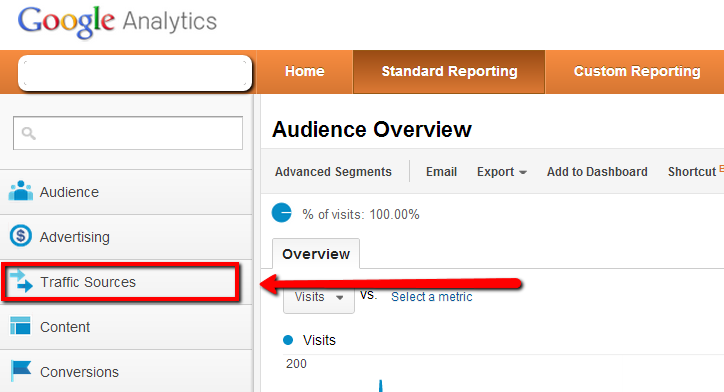
Then click on source

Then click on search

Then click on Organic

Then in the primary dimensions click on source
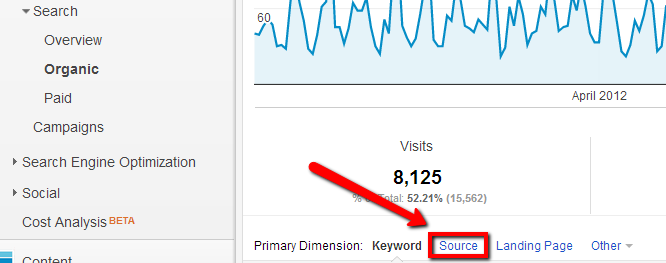
Then click on Google

Now set your time frame to January 2012 – Present

Now your findings should be pretty obvious. If you see a huge drop in traffic from google on or around April 24, 2012 you have been hit by Penguin. It might look something like this:

Next is the test to see if the loss of traffic is due to an algorithmic change or due to an un-notified manual penalty.
Send in a reconsideration request. It’s that simple.
If you receive a response like the one below than your loss in traffic is due to an algorithmic penalty.
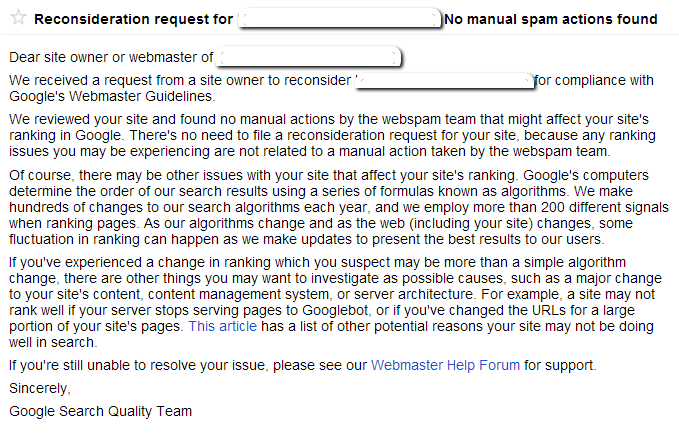
If you receive a response like the one below than you have been issued an un-notified manual penalty.
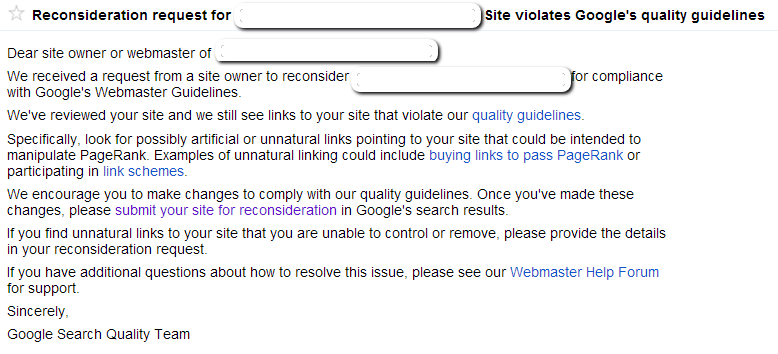
No Penalty
If you have not experienced a loss in traffic or search rankings and you have not received a notification of a penalty in your Google Webmaster Tools account then you are in pretty good shape. However, this does not mean you are completely out of the water just yet. Google is getting smarter and smarter every day and if you have participated in any unnatural linking or questionable link building strategies you are still in danger. No one knows what algorithm changes will be made and what they will issue penalties for in the future.
I would recommend still trying to clean up your inorganic links as a preventative measure so that you safe guard yourself from any of this trouble down the road.
The Cure for a Penguin Bite
Hopefully, you have now been able to diagnose your type of Penguin Bite. Unfortunately this was the easiest part. Next is the painstaking task of trying to recover from your penalty. The recovery process, for the most part, is the same for both manual penalties and algorithmic penalties. The main difference is the reconsideration request process for manual penalties which I will discuss in another post.
In my next post I will explain in detail how to recover your law firm website from both the Manual Google Penalties and the Algorithmic Penalties. People make the recovery process seem a lot more intimidating than it actually is. It takes a good amount of time but as long as you have the right strategy and know exactly what to do it should be smooth sailing to getting your penalties lifted.
If you have any questions or have anything you would like to add that our readers might find useful please feel free to leave us a comment below.
Follow me @JoeBrickk




